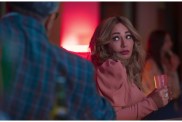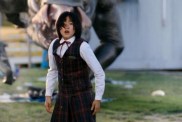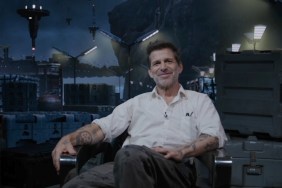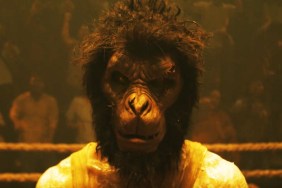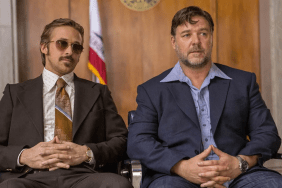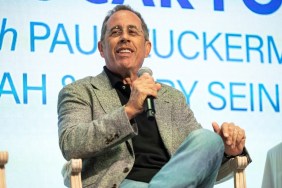Ever since making his American debut with RoboCop twenty years ago, Dutch director Paul Verhoeven has become reknowned for his wild, sensationalistic Hollywood films full of sex and violence, the best (and worst) examples of the former being 1992’s Basic Instinct and 1995’s Showgirls. It’s been over six years since Verhoeven’s last film Hollow Man and in that time, two of his movies had direct-to-video sequels without his involvement–a third probably should have been released direct-to-video.
In some ways, Verhoeven’s latest film Black Book is a return to the basics of his 1978 WWII film Soldier of Orange as it examines the Dutch Resistance during the German occupation of Holland with charismatic Dutch actress Carice van Houten at the center of the story about a Jewish singer who literally gets into bed with the Nazis to survive. One of the German officers she beds, played by Sebastian Koch of the Oscar-winning The Lives of Others, ends up helping the Resistance as the war came to an end.
ComingSoon.net spoke to the visionary Dutch filmmaker during a brief visit to New York City where Black Book was being shown as part of the Lincoln Center Film Society’s “Film Comment Selects” program
ComingSoon.net: It seems like you’ve been out of things for a while, so why did you decide to return to Holland and after nearly 20 years working in Hollywood?
Paul Verhoeven: The decision to move to Holland had to do with the fact that the best script was there. After “Hollow Man,” I felt that I should change gears, because I felt that it wasn’t a personal movie anymore. It did okay. “Starship Troopers” didn’t do so well, but I still consider that a personal movie. With “Hollow Man,” I felt like I could not express myself in a personal way and said that I have to back off from the fantasy and the science fiction or the studios or whatever. I have to do something that’s for me; I want to do something which I believe in again. I tried to find it in the United States. There’s a project that I found which is “The Paper Boy” by Bill Dexter, which was originally a book that was supposed to be done by Pedro Almodóvar, but then he gave up and it came to me. The script is written but there’s still a situation with rights and financing, so that might be a movie that I can do shortly or perhaps in a year.
This was a story that has haunted me for nearly 30 years. I mean, major elements of this story were found when I was doing research on “Soldier of Orange” in ’77 and ’78, and we couldn’t use it for that movie. My scriptwriter and I always thought it was something extraordinary there in the last year of the war in the city of The Hague where I grew up as a child. It took us a long time to put that together, but it’s not like I decided now to do that movie. I wanted to do that movie for 20 years, even when I emigrated to the United States in ’85. During all these years basically, I kept contact about this project and another one with my scriptwriter. It took us that long to find all the necessary material, because when you start to think that things have to be historically correct then you want everything to have happened and to find things so that we could say that, although the events are manipulated by us and we put them in a certain order, we wanted them to really be true events, so that took time, too. It was only in 2001 that my scriptwriter called me from Holland saying that he’s solved the outline and we can start writing the script. I was still working on American projects at the time but those didn’t come to fruition, at least not in time, and I decided to do this.
CS: I was going to ask about the timeframe since it seemed like you’d been working on this movie for a while.
Verhoeven: Story-wise, yes. The main idea, let’s say, the plot of the little black book and the lawyer and the good German and bad German–Mr. Müntze, Mr. Franken in the movie, their real names were Mundt and Franck–they were were historical, as is the black book. I had been thinking about the script and talking about it for many years, but we never solved it till 2001 or 2002, then the script was ready in 2003-4. It was a project that was long in the thinking and we had many outlines, but never solved it until we made a change in protagonist and things and then it came together. In 2004, the financing started to come together. It took some time because financing in Europe is difficult. It’s a lot of different funding, all asking the same thing. It’s a mosaic that can easily fall apart, but we got it more or less together and we could start shooting in August 2005. They say this is Dutch, but it’s a European production–more money came out of Germany than Holland for example. There’s money from England and Belgium, there’s lots of distribution deals, very complex, there’s money coming from the early Marshall Front, which is the European fund that is Strasbourg, so it’s a really European movie, although the main producer is Dutch and the director is kind of Dutch.

CS: Why did this story haunt you?
Verhoeven: It has something to do with things you don’t expect decent people to do, and you’re amazed that Dutch citizens did this to each other. Also, it shows you what people do in extreme circumstances when they’re under high pressure, which certainly in the last year of the war was the case in the Northern part of Holland that was still occupied by the Germans. The circumstances were horrifying. There was no food anymore, and I remember my father was going every day to the countryside to see if he can find a couple of potatoes. Under that pressure, you see the real character of people, because it’s survival and they have to make decisions about their life. I think it’s haunting because in normal life, living nicely in an apartment in The Hague or living in a nice house in Los Angeles, you’re not dealing with these kinds of decisions you have to make for your daily food, for example. It’s an experience that is probably true for a lot of people still on earth, but not if you’re living like a director in Los Angeles.
CS: You spent a good 15 or 20 years making films in Hollywood, so how has the Dutch film industry changed in the time since you made films there?
Verhoeven: The crews were more professional I would say because there had been this incentive in Holland. Many movies had been made and they were guaranteeing good crews now. I had a completely professional crew that was mostly Dutch and the DP Karl Lindenlaub was American but comes from Germany, and part of the camera crew was completely German. The interior construction was built in Berlin, but the Dutch crew was completely professional. I felt that there was not much difference between shooting in the United States and Holland from the point of view of professionalism. Of course, we’re avoiding all the digital effects, because you cannot compare with what Americans can do with digital processing and imagery. Nowhere in Holland could anybody do that. I could never do a movie like “Starship Troopers” or “Hollow Man” in Holland, but I could do a movie with real elements. I insisted on reality, so the planes are real, the boats are real, everything is real.
CS: Also in regards to Holland vs. Hollywood, you made a lot of movies with enormous budgets, but you must have been working with less money on this. How were you able to achieve such an epic aspect to the film?
Verhoeven: Digital planes are expensive, too. The power of a four-motor flying fortress coming over your head, you can never imagine that digitally, but I think the reality is stronger. And if you really get the reality, if it’s available
obviously with science fiction movies, it’s not there, but with this movie, we got the flying fortress out of England. We got an old restored Mitchell out of Holland, and the trains were still there in the museum. We just got them working again. We found the boats in Holland and Germany. We just used everything that’s possible and all that stuff was available to us. After the experience of “Hollow Man” and “Starship Troopers,” and even the other science fiction movies, I really wanted it to be real. I think one of the reasons to make this movie was to get out of fantasyland or science fiction, and really going back to reality. At the beginning of my Dutch career of course, all the movies that I did in Holland mostly are based on biographies or autobiographies, about real things. I wanted to go back to that, as I felt I had been dwelling long enough in fantasyland. In the United States, I’m known most as a science fiction and action director, so when I was coming with projects that are realistic like the one about this woman in the 19th Century, Victoria Woodhill, who was a prostitute and a healer and also a proto-feminist and also running for President, a very interesting woman, but I didn’t get that off the ground. Probably, people wouldn’t believe in me anymore. “Showgirls” closed a lot of doors, because that was kind of realistic
too realistic probably.
CS: Can you talk about recreating this period in Dutch history?
Verhoeven: There are still a lot of streets that we can use in Holland, they have not been changed too much. For example, you have to change the shops basically and the advertisement, but in general, I could find everything that I needed. It was all still there, but it was much more difficult than 30 years ago when I was doing “Soldier of Orange” which was also World War II, then you could find it everywhere, now you really have to look for it. Our location scout took forever, but we found it all in Holland, but we really had to travel [all over] to get it all in frame. Then we had an enormous well-documented archive with hundreds of hundreds of photographs and video, so that all the props and production design department and the costume department could all refer to this enormous archive we had built up. So everybody had access to that and everybody used that. I think the movie is very precise and I don’t think we made any mistakes, not even in the German ranks that are very complicated, but I think we got all that right. It was a hassle, yes, and we could have shot several interiors but we shot only a couple of them because we had a specific financial deal in Germany with Battelsburg Studios that made it cheaper to build a lot of the interiors there.

CS: The movie looks amazing with such vibrant colors and everything about it. Was this somehow related to Holland in the era or just a look that you invented to make it look different?
Verhoeven: I think to a certain degree when you do a movie set in a time, you probably are influenced, automatically and unconsciously I would say, by films out of that time, although the editing is very modern, clearly, but the photography is a bit classic. We even played with the idea of taking more of the colors out but ultimately decided not to do that. There’s a tendency to do that but it makes it very flat, I think. We spent time on making it as atmospheric as we could in the timeframe we had to shoot it in. Because it was so long in the making, it probably in my mind became archetypical and I think that’s what you feel.
CS: Can you talk about how you found Carice? Her character has to be smart and she has to be sexy enough to have men eating out of her hand. It’s a very demanding role.
Verhoeven: Strangely enough, when I came back to Holland after 20 years, the first thing I started to do was to look at the Dutch movies of the last five years, because I was looking for young people that I absolutely would not know. I used some people that I knew from my old movies, like the lawyer was “Soldiers of Orange” and “Turkish Delight,” Thom Hoffman, the doctor, was one of the principals of “The Fourth Man,” and Derek de Lindt, who plays the leader of the Resistance was in “Soldier of Orange.” So there was an older generation that I used, but there was a lot of younger people of the age of Carice, her girlfriend and the people around her. I had to check out young actors that I didn’t know, so I looked at the DVDs that were available, and strangely enough, I found a movie called “Minoes” in which she plays a cat, it’s for children. In my heart, I dismissed her immediately, because I could not see that actress doing my adult heavy-weight acting role, but my casting director who I’ve used for all my Dutch movies came out of retirement to help me with this movie, said, “Maybe you should look at her again because that movie’s not representative of her. You should audition her.” We did two months of auditions but she came in on the first day of auditions and after half an hour, it was completely clear after half an hour that Carice was the perfect choice. The acting was perfect. She could sing without any problem. She had no problem with nudity. She was audacious, and the decision was made instantaneously that day.
CS: Part of the movie was shot in Germany, but I know many people there are a bit touchy about how Germans are depicted in war movies. Can you talk about the balance of maintaining reality but making sure it’s not unbelievable by having “good Nazis” and “bad Nazis”?
Verhoeven: The reality of releasing the film in Holland was that the Dutch accepted the situation without any problem. It was the most successful R-rated film of the last 25 years. The Dutch felt that the situation wasn’t far-fetched in any way. They felt these things had happened more or less. I feel that anyhow, we should stop always seeing the enemy as the devil, which has been promoted by this government in such a strong way. We should always try to find some humanity in the enemy, maybe that’s just my personal humanistic opinion. I don’t think the Christian admonition in these cases is “love your enemy.” Although this is a Christian nation, you cannot say that they do that, would you? I would say at least look at them as human beings that might be motivated by things that they believe in, even if it’s something that we don’t believe in. You can’t take the belief of people away because that’s how they are educated, that’s their environment. I didn’t want to make it a big issue because it’s not set-up as a political movie, but I pointed that out a little bit by using the word the Germans used for the Dutch Resistance fighters that they’d use after capturing them was “terrorists” and that would make you think “who are these people?” when we used the word “terrorists”. [Note: Verhoeven may not be referring to World War II at this point in the conversation.]
CS: I found it interesting that you brought a lot of humor into the movie even though this was obviously a bleak time in Holland.
Verhoeven: I remember from my parents that basically, it was a very bleak time, but there was a lot of social laughing. That’s kind of inherent to the time.
CS: And you’ve included a couple shoot-outs in the movie, so it’s not your typical World War II or Holocaust movie.
Verhoeven: No, no, not at all. I didn’t want to make a Holocaust movie. I took the Holocaust really as a historical situation that happened that’s related to the movie but of course, the movie is also about the Dutch Resistance and the Dutch population basically, moreso than
yes, the Holocaust is there, but not seen as a singularity in time/space. It’s just a historical event, or reduced in this case to the fact that a group of Jewish people tried to escape and got killed, which was happening all the time.

CS: So next for you is going to be “Azazel: The Winter Queen”, and that’s something you’re going to jump right into?
Verhoeven: No, I started already. We’re going to scout in Pittsburgh in two weeks and basically we started doing the casting, I’m building up my crew and we will shoot the first of July or the first of August.
CS: Are you going to do the movie in a similar way with European funding?
Verhoeven: Yes, but there’s an English-American producer who has a company in Europe and in the United States called Seven Arts, and a lot of the money comes from there, but it will be in a similar way.
Black Book opens on Wednesday, April 4.
